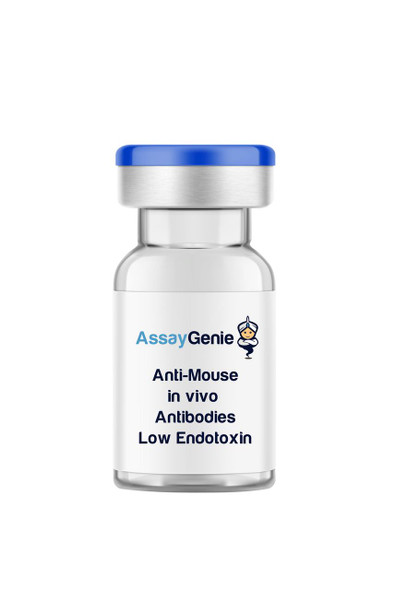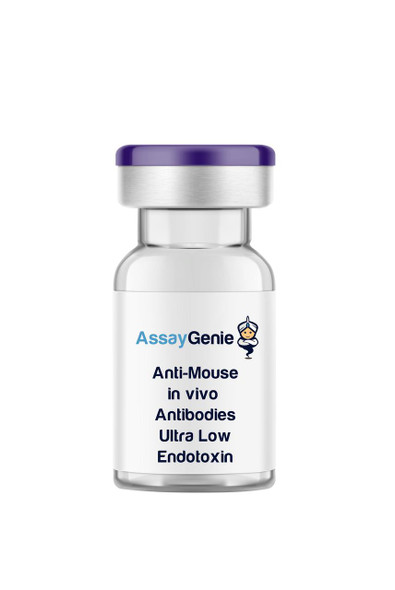Anti-Mouse IFNα In Vivo Antibody - Ultra Low Endotoxin
- SKU:
- IVMB0174
- Product Type:
- In Vivo Monoclonal Antibody
- Clone:
- TIF-3C5
- Protein:
- Interferon Alpha
- Isotype:
- Armenian Hamster IgG1
- Reactivity:
- Mouse
- Synonyms:
- IFNa
- Synonyms:
- interferon alpha
- Research Area:
- Interferons
- Endotoxin Level:
- Ultra Low Endotoxin
- Host Species:
- Armenian Hamster
- Applications:
- Blocking
- Applications:
- FA
- Applications:
- Neutralizing
- Applications:
- WB
Description
| Product Name: | Anti-Mouse IFNα In Vivo Antibody - Ultra Low Endotoxin |
| Product Code: | IVMB0174 |
| Size: | 1mg, 5mg, 25mg, 50mg, 100mg |
| Clone: | TIF-3C5 |
| Protein: | Interferon Alpha |
| Product Type: | Monoclonal Antibody |
| Synonyms: | IFNa, interferon alpha |
| Isotype: | Armenian Hamster IgG1 |
| Reactivity: | Mouse |
| Immunogen: | Recombinant murine IFN alpha 5 |
| Applications: | B, FA, N, WB |
| Formulation: | This monoclonal antibody is aseptically packaged and formulated in 0.01 M phosphate buffered saline (150 mM NaCl) PBS pH 7.2 - 7.4 with no carrier protein, potassium, calcium or preservatives added. |
| Endotoxin Level: | <0.5 EU/mg as determined by the LAL method |
| Purity: | ≥98% monomer by analytical SEC >95% by SDS Page |
| Preparation: | Functional grade preclinical antibodies are manufactured in an animal free facility using only In vitro protein free cell culture techniques and are purified by a multi-step process including the use of protein A or G to assure extremely low levels of endotoxins, leachable protein A or aggregates. |
| Storage and Handling: | Functional grade preclinical antibodies may be stored sterile as received at 2-8°C for up to one month. For longer term storage, aseptically aliquot in working volumes without diluting and store at -80°C. Avoid Repeated Freeze Thaw Cycles. |
| Applications: | B, FA, N, WB |
| Reactivity: | Mouse |
| Host Species: | Armenian Hamster |
| Specificity: | Clone TIF-3C5 recognizes an epitope on mouse IFNα (subtypes IFN-αA, -1, -4, -5, -11, and -13) and does not bind murine IFNγ or IFNβ. |
| Antigen Distribution: | IFNα is expressed by hematopoietic cells, predominantly plasmacytoid dendritic cells (pDCs), following stimulation. |
| Immunogen: | Recombinant murine IFN alpha 5 |
| Concentration: | ≥ 5.0 mg/ml |
| Endotoxin Level: | <0.5 EU/mg as determined by the LAL method |
| Purity: | ≥98% monomer by analytical SEC >95% by SDS Page |
| Formulation: | This monoclonal antibody is aseptically packaged and formulated in 0.01 M phosphate buffered saline (150 mM NaCl) PBS pH 7.2 - 7.4 with no carrier protein, potassium, calcium or preservatives added. |
| Preparation: | Functional grade preclinical antibodies are manufactured in an animal free facility using only In vitro protein free cell culture techniques and are purified by a multi-step process including the use of protein A or G to assure extremely low levels of endotoxins, leachable protein A or aggregates. |
| Storage and Handling: | Functional grade preclinical antibodies may be stored sterile as received at 2-8°C for up to one month. For longer term storage, aseptically aliquot in working volumes without diluting and store at -80°C. Avoid Repeated Freeze Thaw Cycles. |
IFNα antibody, TIF-3C5, recognizes interferon (IFN)-α, a pleiotropic cytokine belonging to the type I IFN family of cytokines. IFNα is induced following recognition of microbial products via pattern-recognition receptors (PRRs). Hematopoietic cells, particularly plasmacytoid dendritic cells (pDCs), are the predominant source of IFNα following stimulation1,2. IFNα binds to the ubiquitously expressed common type I IFN receptor (IFNAR) that consists of the α-chain (IFNAR1) and the β-chain (IFNAR2), ultimately resulting in the transcription of various IFN-stimulated genes (ISGs) that contribute to antiviral immunity. ISGs directly promote antipathogenic activity by inhibiting viral entry, transcription, translation, and assembly in host cells. ISGs also synergize with other cytokines to activate innate effector cells, such as NK cells and dendritic cells (DCs), augment host adaptive immune responses, and enhance antigen presentation3. IFNα plays a role in the pathogenesis of autoimmune diseases, such as systemic lupus erythematosus (SLE)4. In addition, IFNα has multiple anti-tumor properties, including direct cytotoxicity of tumor cells and stimulating innate and adaptive immune cells, and IFNα is FDA-approved for the treatment of multiple cancers5.
| Technical Datasheet: | View |
| Protein: | Interferon Alpha |
| Research Area: | Apoptosis, Cell Biology, Cell Death, Signal Transduction, Tumor Suppressors |
Meet the team!
Shane Costigan
Territory Manager & Team Lead
Abdul Khadim
Sales Executive






